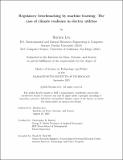Regulatory benchmarking by machine learning: The case of climate resilience in electric utilities
Author(s)
Lyu, Beichen
DownloadThesis PDF (1017.Kb)
Advisor
Knittel, Christopher R.
Terms of use
Metadata
Show full item recordAbstract
Regulatory targets are becoming increasingly complex to benchmark, including electric utilities’ climate resilience (“utility resilience”) that are non-linear and highdimensional. Meanwhile, machine learning (ML) models have been developed, and continue to be developed, with desirable properties such as local optimality and data compression. To explore the synergy between ML and benchmarking, we review and discuss the literature from both sides in the context of government regulation.
Then we dive into a case study of utility resilience, where the dual complexities of the climate and power systems converge, with climate impacts that are likely to harm resilience and increase risks. However, these complicated and changing climate impacts are overlooked in the current regulations of utility resilience [30]. We examine how benchmarking could be applied to fill this regulatory gap through performance incentive mechanisms and elaborate on the political-economic implications, both advantages and potential pitfalls, of its application.
With these theoretical understandings, we experiment with benchmarking weatherrelated power outages in New England, US between 2010-2021. We propose a data regime by combining station-level weather data with district-level outage data, as well as a baseline model using ridge regression. We also deploy our model through an online portal, as well as discuss its limitations on long-tail distributed outage and weather data. Our studies could inform future ML-based benchmarking for regulatory uses, particularly over utility resilience, that balances accuracy, accessibility, and applicability.
Date issued
2023-09Department
Massachusetts Institute of Technology. Institute for Data, Systems, and Society; Technology and Policy ProgramPublisher
Massachusetts Institute of Technology